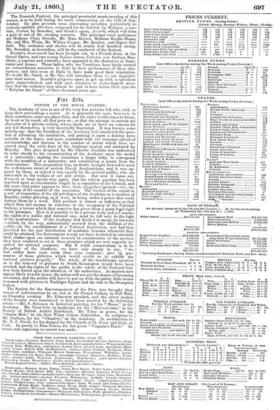/int 3rts.
REFORM IN THE ROYAL ACADEMY,
The Academy of Arts is one of the very few societies left who wish to keep their proceedings a secret. As is generally the case, however, in these conclaves, some one plays false, and the outer world comes to know, by hook or by crook, all that goes on ; so that the attempt to sustain the character of a private society, whose deeds aro to have no concern for any but themselves, is very deservedly frustrated. It was known, some months ago, that the President of the Academy had considered the ques- tion of reforming the institution, and putting it upon a footing more suitable to the times, and more consistent with the immense spread of art-knowledge and increase in the number of artists which have oc- curred since the early days of the Aeademy created and nurtured by Royalty. The plan proposed by Sir Charles Eastlake was understood to refer chiefly to the reconstruction of the Academy upon the model of a university ; making the Associates a larger body, to correspond with the members of a university, and constituting a senate from the Academicians. This proposition was, no doubt, brought forward to meet the well-known views of certain liberal Academicians, and it was op- posed by them, as indeed it was equally by the general public, who are interested in the welfare of art and artists. But now it turns out, if report at least speaks true again, that the reform question has been reported upon at considerable length by a committee of the Council, and the more vital point appears to have been altogether ignored—viz., the enlarging of the number of the associates. The burden of the report is a sort of reassertion of the old privileges of the Academy as a creature of Royalty, rather glorying, as it were, in being under a power that could destroy them by a word. This position is almost as ludicrous as that which they also assume in reference to the occupancy of the National Gallery, a tenure which they conceive has given them a quasi-legal right to the premises. How it is possible to be a private body and yet assume the rights of a public and national one, must be left only to the logic of the academicians. If the Academy had decided to merge its interests —which, by the way, substantially accrued from the shillings of the ;.ublic—in the establishment of a National Institution, and had thus provided for the just distribution of academic honours whenever they could be attained, tbe Government would not have hesitated to entertain their claims upon rile national treasury in consideration of the services they have rendered to art in those premises which are now urgently re- quired for national purposes. But if stolid conservatism is to be the policy of the Academy, we have only simply to say, "we had rather have your room than your company ; give up pos- session of those galleries which would enable us to exhibit the national pictures poperly." The whole of the troublesome question as to the removal of pictures to South Kensington would have been avoided, had the rights of the public to the whole of the National Gal- lery been forced upon the attention of the authorities. As matters now appear likely to settle down, the artists will not get the chance of becoming associates, and the public will have to put up with the paltry little rooms crammed with pictures in Trafalgar Square and the ride to the Brompton boilers.
The Society for the Encouragement of the Fine Arts brought their season of conversazione to an end at the French Gallery in Pall Mall, on Thursday evening. Mr. Edmcston presided, and the silver medals of the Society were announced to have been merited by the following artists :—Mr. S. Solomon in historical painting, for his "Moses" in the Academy. Mr. Vicat Cole in landscape, for his "Harvest-time," in the Society of British Artists' Exhibition. Mr. Tidey in genre, for his "Queen Mab," in the New Water Colour Exhibition. In sculpture to Mr. Durham, for his "Chastity," in the Academy. In architecture to Mr. S. J. Nicoll, for his designs for the Church of St. Peter and Paul, at Cork. In poetry to Miss Power, for her poem "Virginia's Hand." In music and engraving no award was made.


























 Previous page
Previous page